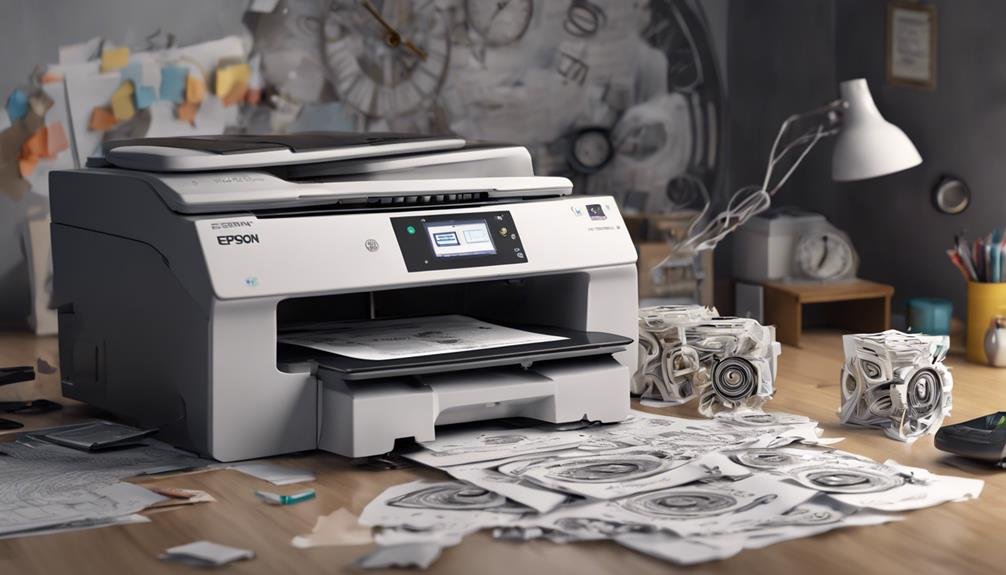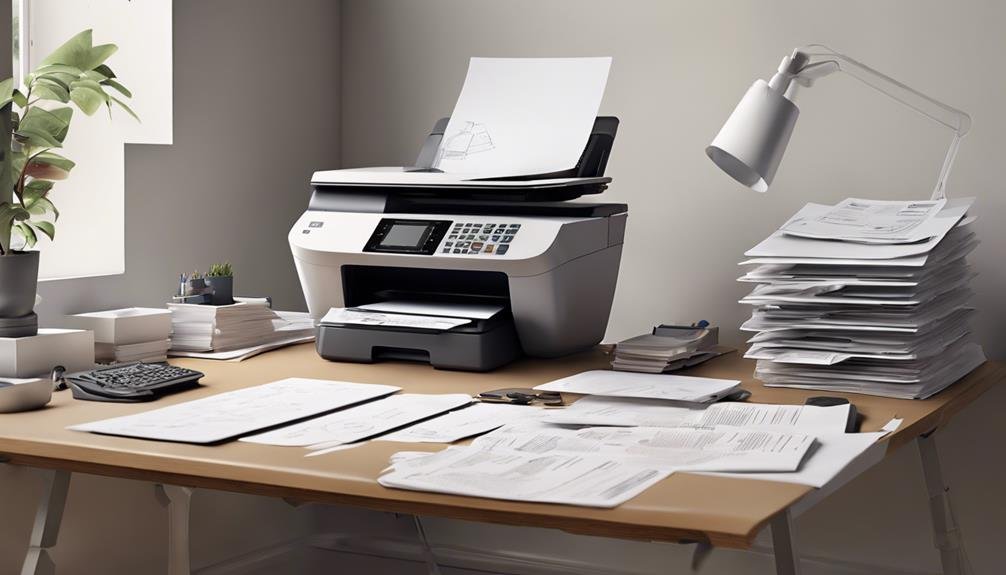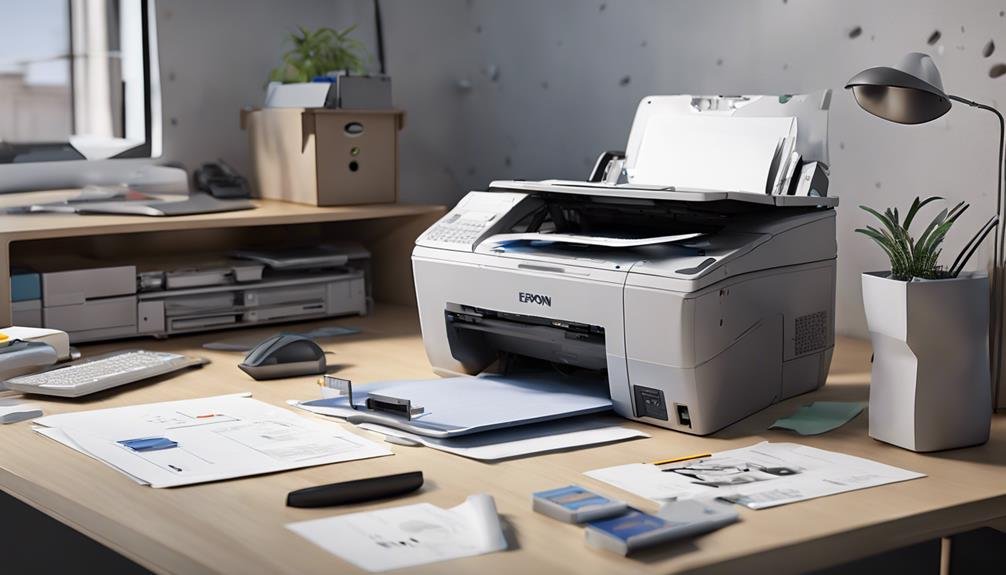When deciding between Epson and HP printers, you'll find that both brands offer high-quality text and photo printing. However, distinct differences in ink performance, print speed, and maintenance requirements set them apart. Epson printers excel in fine detail and color saturation for photos, while HP printers offer faster drying times and better smudge resistance. Epson's EcoTank printers come with two years' worth of ink, but initial setup can be messy. HP printers are preferred for high productivity environments and offer flexible ink subscription plans. As you weigh your options, consider factors like print quality, ink performance, and maintenance needs to make an informed decision that suits your specific requirements, and investigate further to uncover the nuances that will ultimately sway your choice.
Print Quality Comparison
When it comes to producing high-quality text, both Epson and HP printers deliver results comparable to laser printers, with Epson's WF-2760 standing out for its sharply printed text and fast print time.
You'll be impressed with the crisp, clear text produced by these printers, making them suitable for professional documents and reports.
Regarding photo printing, Epson's XP-640 excels in fine detail and color saturation, producing glossy photos that will impress.
Canon, another major player in the printer market, also offers high-quality print options, such as the Canon Pixma TS6020, which delivers bookworthy text prints with sharp details.
Whether you're printing on glossy paper or regular paper, these printers guarantee your photos look vibrant and realistic.
With the right ink and paper combination, you can achieve professional-looking results that rival those produced by laser printers.
Whether you're a student, professional, or hobbyist, you can trust Epson, HP, and Canon printers to deliver high-quality prints that meet your needs.
Ink Performance and Cost
Your printing experience largely depends on the ink performance and cost, which can make or break your decision between Epson and HP printers. In terms of ink performance, HP printers generally offer faster drying times and sharper prints with better smudge resistance compared to Epson printers. However, Epson printers may have slower drying times, leading to potential smudging of prints.
Regarding ink costs, HP's Instant Ink subscription plans offer flexible options, including 50 sheets for £2.99, 100 sheets for £3.49, and 300 sheets for £7.99 per month.
On the other hand, Epson's EcoTank printers come with two years' worth of ink, equivalent to 72 cartridges, but the initial setup with ink bottles can be messy. Users value ink costs when selecting a printer, and recent price increases in HP Instant Ink plans have affected the value perception for small home users.
Ultimately, your decision between Epson and HP printers will depend on your priorities: do you prefer faster drying times and sharper prints, or a more affordable upfront cost with potentially slower drying times?
Print Speed and Productivity

In general, in terms of prioritizing print speed and productivity, if you're a busy user who needs to crank out documents and photos quickly, you'll likely favor printers that excel in these areas.
Epson printers generally lag behind HP printers when it comes to print speed. The Epson XP-640, for example, boasts an average print speed of 5.1 ppm for graphics printing, making it the fastest among Epson models.
However, HP printers like the OfficeJet 4650 offer quicker print speeds, making them more suitable for high-productivity environments.
If you're seeking efficient glossy photo printing, the Canon TS6020 leads the way, completing a print in just 1 minute and 54 seconds.
On the other hand, HP printers, such as the Envy 5540, are renowned for their efficient print speed, making them a preferred choice for productivity-focused users.
In terms of graphics printing, the Epson XP-640 surpasses models from Epson, Canon, and HP.
If you're aiming for high productivity and efficiency, HP printers might be the superior choice, while Epson printers could be more appropriate for smaller-scale printing needs.
Connectivity and Mobile Printing
With wireless connectivity and mobile printing capabilities at the forefront of modern printing needs, Epson and HP printers offer inclusive approaches to seamless printing on-the-go. You can enjoy convenient mobile printing with Epson's Connect app, which allows you to print from your smartphones and tablets wirelessly.
Likewise, HP's Smart app provides a smooth mobile printing experience, making it easy to print from your devices. Both Epson and HP printers support popular mobile printing standards, including Apple AirPrint and Google Cloud Print, ensuring that you can print from your iOS and Android devices with ease.
HP printers take it a step further with Wi-Fi Direct and NFC capabilities, allowing you to print wirelessly without the need for a network connection. Moreover, both Epson and HP printers offer options for printing from cloud services like Google Drive and Dropbox, adding an extra layer of convenience to your printing experience.
Whether you're printing from your smartphone or accessing files from the cloud, Epson and HP printers have got you covered with their inclusive connectivity and mobile printing capabilities.
Paper Handling and Capacity

As you shift your focus from printing on-the-go to handling printing tasks at your desk, paper capacity and handling capabilities become important considerations.
When it pertains to paper handling, Epson printers like the EcoTank ET-7460 typically offer a higher paper capacity, with around 250 sheets, making them suitable for moderate printing needs. In contrast, HP printers such as the Smart Tank Plus 651 often have a lower paper handling capacity, averaging around 100-150 sheets.
Epson models may also feature dual paper trays, allowing for easy media switching and accommodating different paper types or sizes. On the other hand, HP printers commonly have a single paper input tray, which may limit flexibility in handling different types of media.
Notably, Epson printers are known for their reliable and efficient paper handling mechanisms, ensuring smooth printing experiences. This means you can rely on them to handle your printing tasks efficiently, without jamming or other issues.
Copy and Scan Functionality
When copying and scanning documents, your printer's ability to accurately reproduce colors and capture details can make all the difference in preserving the original's integrity. You'll want a printer that excels in copy and scan functionality to guarantee your documents look their best.
| Printer Brand | Color Reproduction | Scan Quality |
|---|---|---|
| HP | Excellent on plain paper | Good for different types of documents |
| Epson | Smooth changes in color graphics | Good for color graphics |
| Canon | Good for different types of documents | Excellent scan quality |
Consider the type of documents you frequently copy and scan to choose the best printer for your needs. If you work with colorful graphics, Epson's smooth changes might be the way to go. For plain paper documents, HP's excellent color reproduction might be the better choice. Canon models offer a balance of good color reproduction and scan quality. Remember, each brand and model may vary in copy and scan speeds, impacting your productivity. By understanding the strengths of each brand, you can find the best printer to meet your specific needs and enhance your productivity.
User Experience and Setup

You'll encounter a more complex setup process with both Epson and HP printers, requiring more time and effort to get started. Initial wifi setup can be a challenge, especially when connecting to password-protected networks, so be prepared to troubleshoot.
With Epson printers, you'll need to physically pour ink from bottles into tanks during setup, which can be messy if not done carefully. In contrast, HP printers involve traditional cartridge installation, a more straightforward process.
Custom setup is often needed for wifi connection on both printers, adding an extra step to the installation process. Moreover, paper loading instructions are often insufficient, leading to frustration during setup.
As you navigate the setup process, keep in mind that both Epson and HP printers require a more hands-on approach. Take your time, and be patient with the installation process to ensure a smooth user experience.
Durability and Maintenance Needs
Durability is an important consideration when choosing between Epson and HP printers, and it is vital to understand the distinct maintenance needs of each brand to guarantee peak performance and extend their lifespan. As you weigh your options, consider the following key differences:
| Brand | Durability | Maintenance Needs |
|---|---|---|
| Epson | Permanent printheads reduce clogging issues | Regular use recommended to prevent clogging, ensuring longevity and consistent print quality |
| HP | Recognized for reliability and ease of maintenance | Minimal maintenance needs, offering hassle-free operation |
| Both | Different maintenance requirements | Epson focuses on preventing clogs, while HP prioritizes reliable performance |
You'll notice that Epson printers are known for their durability, thanks to permanent printheads that reduce clogging issues with regular use. To maintain longevity and consistent print quality, it's recommended to use your Epson printer regularly. On the other hand, HP printers are recognized for their reliability and ease of maintenance, requiring less frequent cleaning and upkeep. With HP, you can enjoy hassle-free operation and minimal maintenance needs. Ultimately, understanding these differences will help you make an informed decision and ensure your chosen printer meets your specific needs.
Frequently Asked Questions
Which Is Better HP or Epson Printers?
When choosing a printer, you'll consider factors like printer quality, ink costs, paper handling, and wireless connectivity. You'll weigh print speeds, color accuracy, noise levels, and design aesthetics against budget options and customer support.
What Are the Downsides of Epson Ecotank?
You'll encounter downsides with Epson EcoTank printers, including clog-prone nozzles, ink waste issues, slow print speeds, and high maintenance costs, making them less appealing for heavy users or those seeking hassle-free printing.
Which Brand of Printer Is the Best?
When choosing the best printer for you, consider factors like print quality, ink efficiency, paper handling, wireless connectivity, compact design, noise level, energy consumption, color accuracy, print speed, and customer support – then weigh your priorities to make an informed decision.
Is Epson a Reliable Printer?
You can trust Epson printers for their reliability, backed by quality construction, durable design, and efficient ink use, ensuring consistent prints, as verified by positive customer reviews and extensive warranty coverage with accessible repair options.
Conclusion
Now that you've compared the Epson and HP printers, you've seen the strengths and weaknesses of each. Epson excels in print quality and ink performance, while HP stands out in print speed and paper handling.
Consider your specific needs: if you prioritize image quality, Epson might be the better choice; if you need high-volume printing, HP could be the way to go.
Weigh the factors that matter most to you and make an informed decision based on your unique printing requirements.